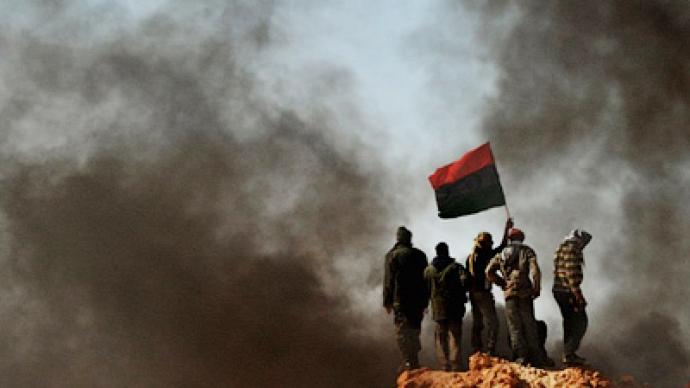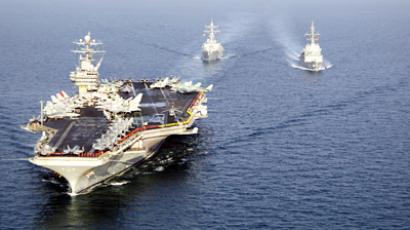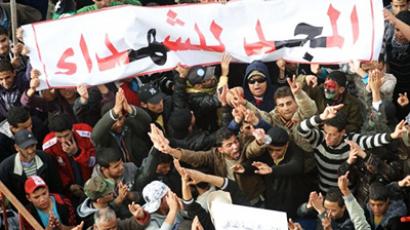We will collect full dossier on Libya’s events - Arab Commission for Human Rights

The main task now is to prevent Gaddafi and his accomplices from destroying evidence of their crimes against the people of Libya, announced Dr. Haytham Manna, spokesperson of the with headquarters in Paris.
Dr. Haytham Manna spoke with RT about the situation in Libya.RT: Dr. Manna, the Arab Commission for Human Rights asked the prosecutor general for the International Tribunal to begin an investigation into the events in Libya. A decision to begin the investigation was made. How will it be carried out?Haytham Manna: First of all the investigation will be made under the authority of the UN Security Council in accordance with clause 13 of the Rome Statute. This clause entitles the Prosecutor General to perform an investigation without any preconditions or limitations, and enables him to move freely and use to the benefit of the investigation anything that may be needed and anything that the suspected criminals are hiding from the investigation. That’s what we’ve achieved. By now two of five groups of our representatives have arrived in Benghazi and started working. Among them there are experts in international law, in medicine, Libyan legislation and economy. Five representatives of the Arab Commission for Human Rights are now working in liberated regions of Libya. Their task is to gather evidence and proof of the crimes committed from the very beginning up to now. The information gathered will be passed over to the Geneva Human Rights Commission and to the Prosecutor General for the International Tribunal. Our main task now is to prevent Gaddafi and his accomplices from destroying evidence of their crimes against the people of Libya. There are attempts to do so now. They clean up the crime scenes, paint over evidence, and gather spent shells to make it impossible to tell what weapons they used in action which led to 2,000 deaths among a peaceful population. Our experts are listing the exact number of victims with names and medical explanations of how they died. It’s very important. RT: Say a few words about co-operation of your commission and the International Tribunal?HM: We’ve co-operated under the framework of the Aggression on Gaza dossier (Palestine), on the Israeli Operation Cast Lead. We provided the tribunal with all necessary data for the investigation. At present the International Tribunal possesses a comprehensive historical dossier on crimes in the Gaza Strip. We will collect a full dossier on Libya’s events with medical proof and evidence of human rights activists so that when the Prosecutor General or his representatives start working in this country they will have all the necessary information. RT: Does the General Prosecutor’s Office need the permission of the Gaddafi regime to start an investigation on Libyan territory?HM: The decision only covers activity on the territory of Libya upon which events took place and crimes were committed. Representatives of the Human Rights Commission and the Prosecutor’s Office of the International Tribunal do not need to visit the other regions of Libya. At present we can visit over two-thirds of Libyan territory and that is why we ask the Prosecutor General to start the investigation immediately and follow our example. We can work in eight liberated cities of Libya and gather all the necessary information. RT: After gathering evidence what steps will you take?HM: We will decide on who’s to blame in general and in particular. Determine all the participants of the crimes; make up a so-called black list of those guilty of crimes against humanity, indicating place and time. All participants in disinformation and military, police and security force operations which led to crimes and the deaths of peaceful innocent citizens will be cited in the report. Criminal cases against them will be initiated within the framework of the International Tribunal. RT: Have you finished work on the list?HM: Thanks to the efforts of human rights activists in Libya we have finished the list, but we consider it a temporary one, because the events are not over yet. At the moment new data and witnesses are appearing every hour. New participants and organized groups of “militia” appear on the scene. Every crime, theft, and cases of pillaging and banditry will be detailed. We will keep a record of all of them till the unrest ends, when the Libyan people put an end to Gaddafi’s dictatorial regime. RT: How do you make your black list? What’s it based on?HM: We made it on the basis of the data we received from Libyan doctors and human rights activists for the period of up to the arrival of our commission’s representatives. Then they provided for the arrival of our doctors and gave them the dossiers they had prepared. Necessary humanitarian aid was designated and only after that the investigating commission on Gaddafi regime’s crimes arrived and started its work.RT: Are you in direct contact with the prosecutor general for the International Tribunal?HM: We are in contact with the International Commission for Human Rights, the Prosecutor General and human rights activists in Libya.RT: Do these organizations use the evidence you’ve obtained?HM: Of course, all the information we provided to those agencies will be used to the full extent. So far they do not have an opportunity to obtain information in any other way. RT: You also fight against the squandering of Libyan natural resources. What have you done in this sphere already?HM: As for economic crimes, we co-operate with Transparency International, the French anti-fraud office, and with the international organization for fight against corruption. We sent documents on economic crimes in Tunisia to these organizations. The accounts of Ben-Ali and his accomplices were frozen, and at the moment we are sending documents on Egypt, but our work is not over yet. Now we’ve started working on the Libyan dossier. We will gather packages of data necessary for an economic investigation with a further blockade and freezing of accounts of Gaddafi’s relatives and immediate contacts, as well as of the people involved in crimes. Our next step will be to search for money transferred from Libya to personal accounts in other countries. Then the cases of corruption leading to transferring of big sums of money to accounts in Asia and Europe will be investigated. These are the measures we are taking in order to return US$113 billion stolen by the colonel and return it to the international investigation organizations. Not to the Council of Europe or France, but to an organization which will be temporarily created to investigate economic crime in Libya. This organization will act on the basis of international law. Nobody will be able to influence its work or decisions. All this is done to prevent the money from influencing the formation of the future Libyan government, and to spend it on the organization of free election. RT: Who has the right to create such an organization?HM: Such an organization can be created at the order of the Council of Europe on the territory of the state where the judicial inquiry will take place – in Germany, France or Britain.RT: And it will keep the money?HM: Right, it will keep the money and make sure that it will not suffer the same fate as the Iranian money frozen by the US for political motives. It’s common knowledge that Iranian assets are frozen on political motives. We do not want the same to happen to Arab revolutions. We hope new Arab states will be able to use this money on development projects; that the money will serve the Libyan people. Then there will be no need for international humanitarian aid. RT: You’ve found out that the stolen assets are US$113 billion. To whom was the money transferred and what happened to it?HM: This money is in the accounts of 48 people. With the help of Libyan bank employees we learned the names of 48 people involved in the theft of an immense sum of money. In one case money was transferred to the account of a dead woman, and her son was the only inheritor. We know all such tricks and we’ll put an end to them. The experience of African countries provides us with such examples. The above mentioned international organizations are aware of such tricks too. RT: Who’s on top of you black list?HM: The man himself, his sons, his wife, head of intelligence, heads of committees, immediate contacts involved in the theft of not millions, but billions in Libyan money. The assets are in Europe, the US and South-East Asia. Real estate is mainly in Europe, and the money is on different accounts. We did not find all of it so far.














